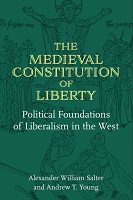The Medieval Constitution of Liberty
External Review of Whole Manuscript
Political Foundations of Liberalism in the West
| dc.contributor.author | Salter, Alexander William | |
| dc.contributor.author | Young, Andrew | |
| dc.date.accessioned | 2023-06-07T09:11:45Z | |
| dc.date.available | 2023-06-07T09:11:45Z | |
| dc.date.issued | 2023 | |
| dc.identifier.uri | https://library.oapen.org/handle/20.500.12657/63396 | |
| dc.description.abstract | Why did enduring traditions of economic and political liberty emerge in Western Europe and not elsewhere? Representative democracy, constitutionalism, and the rule of law are crucial for establishing a just and prosperous society, which we usually treat as the fruits of the Renaissance and Enlightenment, as Western European societies put the Dark Ages behind them. In The Medieval Constitution of Liberty, Salter and Young point instead to the constitutional order that characterized the High Middle Ages. They provide a historical account of how this constitutional order evolved following the fall of the Western Roman Empire. This account runs from the settlements of militarized Germanic elites within the imperial frontiers, to the host of successor kingdoms in the sixth and seventh centuries, and through the short-lived Carolingian empire of the late eighth and ninth centuries and the so-called “feudal anarchy” that followed its demise. Given this unique historical backdrop, Salter and Young consider the resulting structures of political property rights. They argue that the historical reality approximated a constitutional ideal type, which they term polycentric sovereignty. Salter and Young provide a theoretical analysis of polycentric sovereignty, arguing that bargains between political property rights holders within that sort of constitutional order will lead to improvements in governance. | en_US |
| dc.language | English | en_US |
| dc.subject.classification | thema EDItEUR::J Society and Social Sciences::JP Politics and government | en_US |
| dc.subject.classification | thema EDItEUR::J Society and Social Sciences::JP Politics and government::JPH Political structure and processes::JPHC Constitution: government and the state | en_US |
| dc.subject.classification | thema EDItEUR::N History and Archaeology::NH History::NHD European history | en_US |
| dc.subject.other | medieval constitution of liberty, economic freedom, political liberalism, medieval Europe, High Middle Ages, political property rights, rule of law, constitutionalism, political economy, Great Enrichment, Great Divergence, representative political institutions, representative assemblies, institutional economics, constitutional economics, polycentricity, federalism, feudalism, sovereignty, classical liberalism, medieval constitution | en_US |
| dc.title | The Medieval Constitution of Liberty | en_US |
| dc.title.alternative | Political Foundations of Liberalism in the West | en_US |
| dc.type | book | |
| oapen.identifier.doi | 10.3998/mpub.11991074 | en_US |
| oapen.relation.isPublishedBy | e07ce9b5-7a46-4096-8f0c-bc1920e3d889 | en_US |
| oapen.relation.isbn | 9780472076017 | en_US |
| oapen.relation.isbn | 9780472056019 | en_US |
| oapen.pages | 310 | en_US |
| peerreview.anonymity | Double-anonymised | |
| peerreview.id | d98bf225-990a-4ac4-acf4-fd7bf0dfb00c | |
| peerreview.open.review | No | |
| peerreview.publish.responsibility | Scientific or Editorial Board | |
| peerreview.review.decision | Yes | |
| peerreview.review.stage | Pre-publication | |
| peerreview.review.type | Full text | |
| peerreview.reviewer.type | External peer reviewer | |
| peerreview.title | External Review of Whole Manuscript | |
| oapen.review.comments | The proposal was selected by the acquisitions editor who invited a full manuscript. The full manuscript was reviewed by two external readers using a double-blind process. Based on the acquisitions editor recommendation, the external reviews, and their own analysis, the Executive Committee (Editorial Board) of U-M Press approved the project for publication. |

